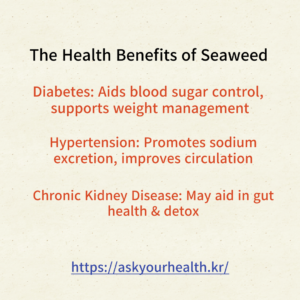
1. How Seaweed Affects Health
Seaweed benefits, Seaweed is a nutrient-dense food rich in dietary fiber, iodine, potassium, and various minerals. It contains functional compounds such as:
✔ Alginate – Helps regulate blood sugar and reduce sodium absorption
✔ Fucoidan – Supports immune function and cardiovascular health
✔ Laminaria – Offers anti-inflammatory and antioxidant benefits
Seaweed has been widely studied for its potential health benefits, including:
✔ Antioxidant properties – Helps protect cells from oxidative stress
✔ Blood sugar regulation – Slows carbohydrate absorption to prevent blood sugar spikes
✔ Blood pressure management – Helps remove excess sodium, lowering hypertension risk
✔ Gut health improvement – Acts as a prebiotic, promoting beneficial gut bacteria
However, excessive consumption may lead to thyroid dysfunction, high sodium intake, and potassium overload, so moderation is key.
2. Seaweed Consumption Guide for Diabetes Patients
✅ How Seaweed Helps Manage Diabetes
1) Blood Sugar Control
Seaweed is high in soluble fiber, which slows the absorption of glucose in the intestine, preventing post-meal blood sugar spikes.
- A 2021 study published in the Journal of Nutritional Biochemistry found that regular seaweed intake significantly reduced fasting blood glucose and HbA1c levels.
2) Supports Weight Management
- The fiber in seaweed increases satiety, preventing overeating and helping with weight control, which is crucial for diabetes management.
3) Gut Health Improvement
- Fucoidan and alginate in seaweed help nourish beneficial gut bacteria, which can indirectly enhance insulin sensitivity.
⚠ Precautions for Diabetes Patients
- Avoid consuming salty seaweed soup – Opt for lightly seasoned preparations.
- Monitor iodine intake – Excess iodine can affect thyroid function, impacting metabolism.
💡 Best Ways to Consume Seaweed
✔ Use in salads or sushi instead of salty soups
✔ Pair with lean proteins like tofu or chicken for balanced nutrition
📊 Glycemic Index (GI) of Seaweed vs. Other Foods
| Food | Glycemic Index (GI) |
|---|---|
| White rice | 73 |
| Brown rice | 50 |
| Seaweed | 15 |
3. Seaweed Consumption Guide for Hypertension Patients
✅ How Seaweed Helps Manage Hypertension
1) Promotes Sodium Excretion and Lowers Blood Pressure
- Alginate in seaweed binds to sodium and helps its excretion, reducing blood pressure levels.
- A 2019 study in the Hypertension Journal showed that regular seaweed intake decreased systolic blood pressure by an average of 5 mmHg.
2) Improves Vascular Health
- Fucoidan helps relax blood vessels, improving circulation and reducing hypertension risks.
⚠ Precautions for Hypertension Patients
- Watch sodium intake from processed seaweed products – Some dried seaweed snacks contain added salt.
- Monitor potassium intake – While potassium helps lower blood pressure, excessive amounts can be dangerous for people with kidney issues.
💡 Best Ways to Consume Seaweed
✔ Prepare seaweed salads with vinegar, which has additional blood pressure-lowering effects
✔ Choose fresh or dried seaweed without added salt
4. Seaweed Consumption Guide for Chronic Kidney Disease (CKD) Patients
✅ Potential Benefits of Seaweed for Kidney Health
- Supports gut health and reduces inflammation, which can benefit overall kidney function.
- May aid in toxin removal due to its high fiber content.
⚠ Precautions for CKD Patients
- High potassium content – Kidneys have difficulty excreting excess potassium, which can lead to hyperkalemia.
- Excess iodine intake – May affect thyroid function, which is already at risk in CKD patients.
💡 Best Ways to Consume Seaweed for CKD Patients
✔ Soak seaweed in water before consumption to reduce potassium levels
✔ Avoid seaweed soups and high-sodium seaweed products
📊 Nutritional Content of Seaweed (per 100g)
| Nutrient | Amount | Function |
|---|---|---|
| Calories | 45 kcal | Low-calorie |
| Sodium | 250 mg | Helps with sodium excretion |
| Potassium | 900 mg | Beneficial for blood pressure but risky for CKD patients |
| Alginate | 3 g | Supports blood pressure and blood sugar control |
5. Conclusion & Summary
Seaweed is a nutrient-rich superfood that offers benefits for blood sugar regulation, blood pressure management, and gut health. However, excessive potassium and iodine intake can be harmful for individuals with kidney disease or thyroid conditions.
✅ Summary of Recommendations
| Condition | Benefits | Precautions |
|---|---|---|
| Diabetes | Aids blood sugar control, supports weight management | Avoid excessive sodium & iodine |
| Hypertension | Promotes sodium excretion, improves circulation | Limit high-sodium seaweed products |
| Chronic Kidney Disease | May aid in gut health & detox | High potassium & iodine levels require caution |
🔔 If you found this article helpful, please share and subscribe! 😊
Constipation and Hemodialysis, Increased Risk of Cardiovascular Events and Mortality